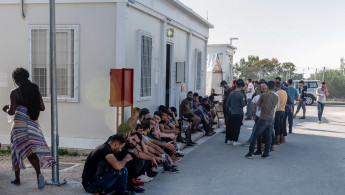Lebanon and Cyprus pushback boats, forcibly return refugees to Syria
Lebanese and Cypriot authorities are violating international obligations by forcibly returning refugees to Syria after they have sought to seek asylum by boat, according to a leading human rights organisation.
A new report by Human Rights Watch released on Wednesday found that Syrian refugees in Lebanon who tried to cross the sea to Cyprus were pulled back by the Lebanese army and the Cypriot Coast Guard before being deported, violating their refugee status and disregarding the dangers in Syria.
Lebanon hosts the highest number of refugees per capita in the world, most of whom live in extreme poverty amid the country’s socio-economic collapse.
The government has been implementing restrictions against Syrians over the past year and half, including voluntary and forced returns, curfews and widespread arrests. It has fuelled tensions between refugees and local populations.
The UN’s refugee agency, UNHCR, is responsible for the 1.5 million refugees in Lebanon and maintains that Syria is unsafe for forced returns and does not promote voluntary return.
HRW’s 90-page report is titled "'I Can’t Go Home, Stay Here, or Leave': Pushbacks and Pullbacks of Syrian Refugees from Cyprus and Lebanon", and includes interviews with 16 Syrians who tried to leave Lebanon by boat between August 2021 and September 2023, as well as boat tracking data and official EU documents.
The report found that Cypriot authorities had expelled hundreds of Syrian refugees without letting them claim asylum, instead putting them on boats to Lebanon where they are met by the army.
Some of those interviewed by HRW said that the Lebanese army had handed them directly to Syrian soldiers at the border.
As many as 50 Syrian men who were returned from Lebanon were detained and disappeared by Syrian authorities in July, according to a report last month in The New Arab's Arabic-language edition Al-Araby Al-Jadeed.
The Syrian regime has launched a massive crackdown on suspected political dissidents since the 2011 revolution, with around 160,000 Syrians detained and many of them feared tortured to death.
Nadia Hardman, refugee and migrant rights researcher at HRW said that Lebanon and Cyprus are violating the "fundamental prohibition" on returning refugees.
"By preventing Syrian refugees from leaving to seek protection elsewhere, and then forcibly returning them to Syria, Lebanon violates the fundamental prohibition on returning a refugee to face persecution, while the European Union helps pay the bills," Hardman said.
"Cyprus also violates this prohibition by pushing refugees back to Lebanon where they risk being sent to danger in Syria."
Those interviewed described how Cypriot coast guard vessels conducted dangerous manoeuvres to intercept boats. In one incident, an unaccompanied 15-year-old Syrian boy was taken by Cypriot officers who put him on a boat to Beirut’s port and was then expelled to Syria via the Masnaa border crossing.
HRW said these "summary expulsions" are breaching Lebanon’s obligations as a party to the UN Convention Against Torture and the customary international law principle of nonrefoulement.
Cyprus is also breaching European Convention on Human Rights by pushing back the refugee boats.
Migrants are travelling some 150 nautical miles in small vessels to Cyprus, paying smugglers thousands of dollars operating around Lebanon’s northern coastal city of Tripoli.
In August, the Lebanese army arrested 204 Syrians attempting to make the crossing, including 150 who were arrested on the beach in the northern Arida area.
The testimonies in the HRW report said that boats usually carry between 17 and 200 people which sometimes include Palestinian refugees and Lebanese nationals.
Cyprus is the first gateway into the European Union for refugees from the Middle East who are often fleeing war, violence and persecution.
Since 2020, Lebanon has undergone a multifaceted economic collapse which has seen poverty rates surge, with refugees being scapegoated for the country’s domestic woes.
The restrictions on work and education have driven many refugees to leave for Europe in a bid for a better life but with few legal routes, many have been forced to pay smugglers for dangerous boat trips across the Mediterranean.
The EU has spent millions of euros on several programmes with Cyprus and Lebanon to enhance "border management", allocating 32 million euros to a border security project in August for the next 12 months.
That followed a three-year major 1 billion euro package to the Lebanese government in May which among social, education, and health protection measures, includes funding allocated for Lebanese security forces training and "to fight against smuggling".




 Follow the Middle East's top stories in English at The New Arab on Google News
Follow the Middle East's top stories in English at The New Arab on Google News


![A group of Palestinians, foreign and Israeli activists gather to participated in an olive picking event on the land in the town of Battir, which is under threat of confiscation by Israel in Bethlehem, occupied West Bank on 8 November 2024. [Getty]](/sites/default/files/styles/image_330x185/public/2182930803.jpeg?h=199d8c1f&itok=__0LgGsa)